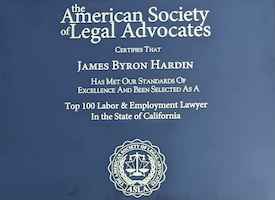What is a “Hostile Work Environment”?
The last place you should feel unsafe is at your workplace. Harassment and hostility at work creates a toxic environment that is both unacceptable and unlawful in California. If you feel as though you are experiencing a hostile work environment at your place of business, reach out to our team to learn the legal action that can be taken.
Harassment in the workplace can occur in many forms. Under FEHA, or the Fair Employment and Housing Act, the term harassment is defined as any behavior targeted against a protected class that is either unwanted or offensive, which can become pervasive or severe. Whether the harassment is sexual, non-sexual, malicious, or unintentional, it is unlawful and can greatly affect your career.
Working in a hostile environment can be incredibly unsettling, make sure you know your rights when it comes to workplace harassment.
Hostile Work Environment Harassment
A hostile work environment can be fueled by either sexual or non-sexual harassment. It is defined as any act that is pervasive or severe involving offensive conduct towards a co-worker or subordinate that creates an abusive atmosphere at work.
Harassment at work can arise from biases against a class protected under FEHA. Whether it is accidental or malicious, discrimination and harassment due to prejudice is illegal. In the state of California, protected classes afforded by FEHA are listed, but not limited to:
- Race;
- Disability;
- Religion;
- Age;
- Nation of Origin;
- Marital Status;
- Sex;
- Pregnancy;
- Gender;
- Military or Veteran Status.
Sexual harassment in any form is unacceptable and unlawful in the workplace. This type of harassment involves inappropriate language, sexual advances, or unwanted touching. Another type of sexual harassment that may arise at work can include inappropriate treatment or comments as a result of an individual’s sex or sexual orientation.
Know Your Rights
Often times workplace harassment victims feel afraid or unsafe to speak out for fear of losing their job. As an individual in the workplace, it is crucial to know the rights that protect you from harassment.
There are many labor laws put in place in order to protect workers from harassment in the state of California.
If you feel you are experiencing a hostile work environment, a course of action that you can take is filing a complaint internally. In some cases, smaller companies do not have protocols in place for complaints of this matter. The best way to proceed in instances like this is to put the company on notice of the inappropriate behavior you are experiencing. In most cases, companies that receive a complaint or notice will conduct an internal investigation in order to determine the best solution.
If an internal investigation results are unsatisfactory there are other courses of action you can take. The Department of Fair Employment and Housing (DFH) and the Equal Employment Opportunity Commission (EEOC) have systems in place for those that need to file a formal complaint in order to ensure that an investigation is conducted. Once the investigation is concluded, the EEOC or the DFH will bring together both parties to negotiate an amicable resolution.
If these negotiations don’t go the way you expected, reach out to our experienced legal team at Hardin Law Group to learn the legal remedies available to you.





















